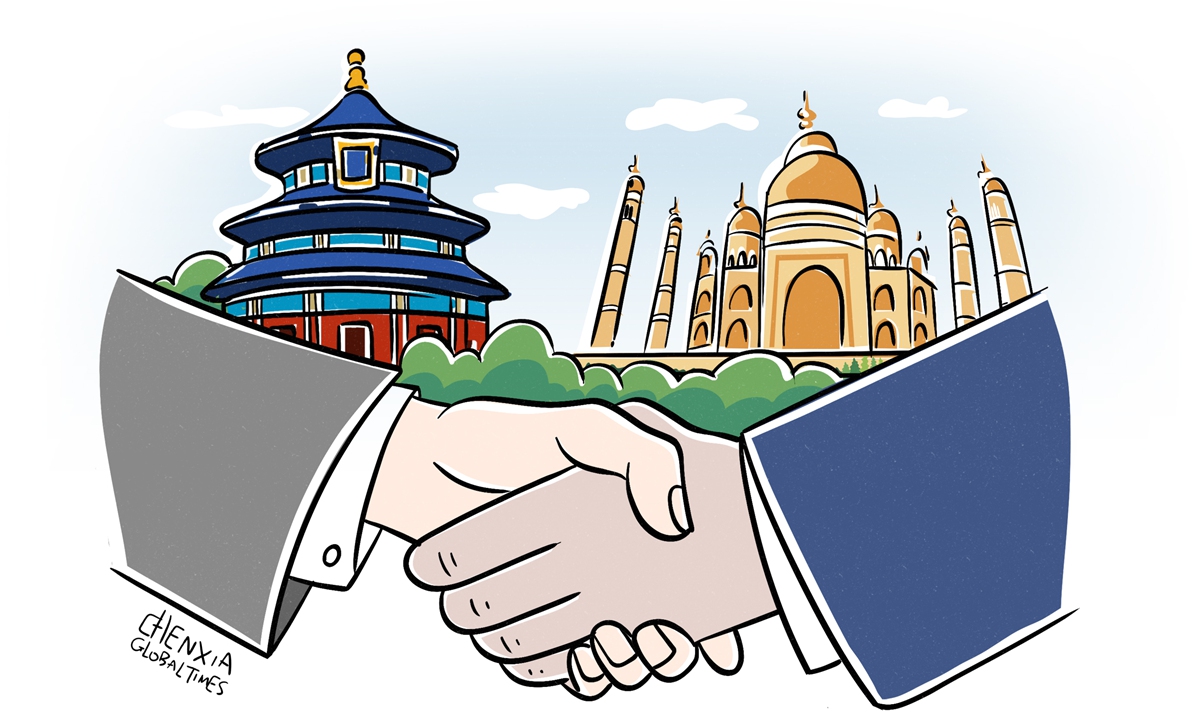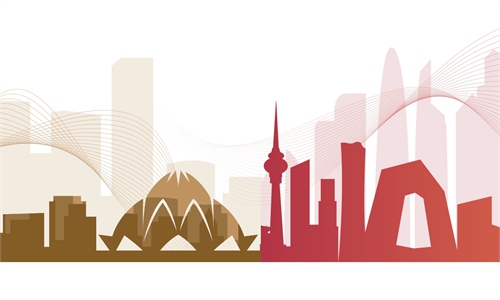
Illustration: Chen Xia/GT
A delegation from an Indian think tank has just concluded its visit to Southwest China's Xizang Autonomous Region. Although the dialogue held in Lhasa was small in scale and brief in duration, it's still a positive start to the gradual easing of China-India relations and the deepening of cultural exchanges.Recently, there have been several positive signals regarding the improvement of China-India relations. On December 18, China's special representative Wang Yi, also a member of the Political Bureau of the Communist Party of China Central Committee and Director of the Office of the Central Commission for Foreign Affairs, held the first special representative official meeting with India's special representative and National Security Adviser Shri Ajit Doval in five years. Expanding cultural exchanges and building a culturally friendly China-India relationship is key to establishing the correct understanding between the two nations.
Since 2013, China-India relations have undergone complex, phased changes. One atypical feature of this relationship is that when bilateral ties decline, cultural exchanges are often the most visibly affected. To some extent, this indicates that the level of cultural exchanges between China and India is relatively low, which does not correspond to the size of their combined population or the significance of both countries as major developing nations. Moreover, mutual perceptions between China and India are influenced by bilateral relations and social public opinion, displaying a considerable degree of emotional volatility.
Since 2023, both China and India have made significant efforts to restore cultural exchanges. In November 2023, the Center for South Asian Studies at Fudan University organized a Chinese delegation to visit New Delhi, where they held a bilateral meeting with the India Foundation. At the end of November 2024, a delegation from the India Foundation visited Fudan University for the annual China-India dialogue. With the support of institutions such as the Xizang Academy of Social Sciences, the second phase of this dialogue was held in Lhasa.
As key members of the Global South, development is a shared priority for both China and India. While their relationship has occasionally experienced some setbacks, these have not been major factors impacting each other's development. After more than a decade of interaction and mutual adaptation, China and India now have a stronger foundation for expanding cultural exchanges.
First, the sensitivity between China and India toward each other has been decreasing. In the past, India was highly sensitive toward China, and this sensitivity was reflected in its attitudes toward initiatives like the Belt and Road Initiative, border issues, and China's rising power. Over the years, New Delhi has come to fully recognize that peace and stability between the two countries form the foundation for the steady progress of China-India relations.
Second, the international status of both countries has become more significant. Now, China remains firmly as the second-largest economy and continues to maintain a steady upward trajectory. India, on the other hand, has experienced rapid growth, with the potential to become the third-largest economy by around 2030. This marks one of the most significant changes in modern history, as two ancient Eastern giants will enter the top tier of the global economy, providing a strong foundation for direct bilateral cultural exchanges.
Third, the public opinion environments in both countries have become more mature. In recent years, the public opinion landscapes in China and India have been continuously evolving, with both nations adopting a rational and calmer attitude toward themselves and the world.
Cultural exchanges rely on government initiatives, which means that both the Chinese and Indian governments need to allocate more resources and take more proactive measures to promote bilateral cultural exchanges. This will help bridge the gap between the strategic needs of both countries and their level of mutual understanding and contribute to putting China-India relations back on a path of healthy and stable development at an early stage.
The author is director of the Center for South Asian Studies at Fudan University. opinion@globaltimes.com.cn


